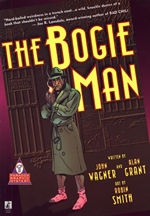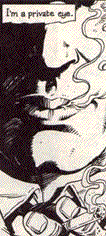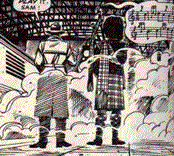>> The Friday Review: Pubo
>> The Friday Review: Get Your War On
More...

 Writers: John Wagner, Alan Grant
Writers: John Wagner, Alan Grant
Artist: Robin Smith
Letterers: Bambos, Ellie DeVille, Simon H Pleatcap
Price: $14.00
Publisher: Paradox Press
ISBN: 0-671-00923-0
THE BOGIE MAN is one of those books that more people should have heard about and read, but haven't. It's written by two of the most respected creators in the British comics industry, it was (and probably still is) the best-selling independent comic book in the UK, and it's even had a BBC TV movie made out of it.
Despite all this, THE BOGIE MAN languishes in relative obscurity, and once the Paradox Mystery Thriller edition of it goes out of print, I don't expect to see it available again any time soon. This review then, is an attempt to get all of you out there who don't own a copy already to buy one while you still can; because THE BOGIE MAN is one of the most bizarrely funny thrillers that I've ever had the pleasure to read.
THE BOGIE MAN was originally conceived in the mid-eighties as a pitch to DC's Dick Giordano, who was visiting the UK on a 'talent scouting' mission. The story, about a mental patient who suffers from the delusion that he is Humphrey Bogart (or to be more accurate, an amalgamation of the characters played by Bogart in his films), was unceremoniously rejected by the pre-Vertigo DC as being totally unsuitable material for the company.
In 1989, however, John McShane of AKA Comics in Glasgow approached the pair about developing THE BOGIE MAN as a Glasgow-set crime series. Wagner and Grant agreed, and later that year McShane's Fat Man Press put out THE BOGIE MAN #1 - the first of a four issue series - to great acclaim. Drawn by Robin Smith, and with the action shifted from New York to Glasgow, THE BOGIE MAN was a blackly comic farce that introduced readers to the psychotic Frances Forbes Clunie - also known as 'Bogie'.
 Unfortunately, creative misunderstandings and financial problems meant that a whole year passed between the publication of #1 and #2, and the series lost much of its initial momentum. After the series concluded, Wagner and Grant decided to take their creation to the ill-fated TOXIC - a weekly anthology title launched in 1991, intending to recreate the early glory days of 2000AD.
Unfortunately, creative misunderstandings and financial problems meant that a whole year passed between the publication of #1 and #2, and the series lost much of its initial momentum. After the series concluded, Wagner and Grant decided to take their creation to the ill-fated TOXIC - a weekly anthology title launched in 1991, intending to recreate the early glory days of 2000AD.
The sequel to the first series, 'The Chinese Syndrome', was initially drawn by Cam Kennedy, but after a promising start, it ground to a halt mid story. Soon after, Wagner and Grant parted company with TOXIC, and the title eventually folded.
A poor TV adaptation starring Robbie Coltrane followed in 1992, and then finally, in 1998, Andy Helfer at DC contacted Wagner and Grant about publishing THE BOGIE MAN as part of the Paradox Graphic Mystery line. Containing the original four-issue mini-series and the now complete 'Chinatoon' story line (the aborted 'Chinese Syndrome', re-drawn by Robin Smith), the book appeared that same year. A final BOGIE MAN story - 'Return to Casablanca' - was set to follow the reprint, but with the Paradox mystery thriller line cancelled, the character is once again back in limbo. As I understand it, there are now also contractual obstacles preventing Wagner and Grant from taking the story to another publisher.
So with another BOGIE MAN story unlikely, the Paradox book is all you've got to go on. The stories here aren't complex or particularly sophisticated; - escaping from Spinbinnie mental hospital on New Year's Eve, Clunie heads for nearby Glasgow (City of mystery! City of intrigue!), where he proceeds to 'build a case' - incorporating every random encounter into the fabric of his delusion to form another hardboiled imaginary exploit. As he pounds the streets, hunting for the 'Fat Man' and the 'Big Bird', Clunie becomes embroiled in a madcap caper involving the theft of a lorry load of frozen turkeys and the wife of the local Gangland villain's Ford Sierra.
'Chinatoon', meanwhile, perhaps unsurprisingly, features some mildly un-PC stereotyping, but it never spills over into the offensive, and is certainly no worse than the fun Wagner and Grant poke at their fellow Scots. Escaping from Spinbinnie's again, Clunie once more 'builds a case' on the mean streets of Glasgow. Through Clunie's eyes, unrelated events such as an arranged Chinese wedding and an attempted arson attack on the 'Golden Rain' takeaway becomes a hunt for the priceless 'Manchurian Dragon' and a deadly duel of wits with 'the Red Devil Tong' and it's fearsome leader, 'Run Run Wok'. Hilarity ensues.
Wagner and Grant's writing will be familiar to the thousands of comic book readers who grew up reading their work in 2000AD - elegantly plotted, no- nonsense storytelling laced with black comedy and dry wit. THE BOGIE MAN is no exception to this, but the more adult tone of the series means that they get to take things much further than they ever did in 'the Galaxy's Greatest Comic', littering the two stories with painful puns, and murky, often crude humour.
 The incongruity between Clunie's glamorous and exciting fantasy world and the grey and wet reality of modern day Scotland is played on for everything it's worth. Wagner and Grant have particular fun with the Scottish accent in their dialogue - the original series included a 'MacGlossary' to help readers understand the Glaswegian terminology; thoughtfully reproduced here by Paradox - and make a ton of old movie jokes. (Check out chapter titles like 'Farewell my Loony' and 'The Treasure of the Ford Sierra'.)
The incongruity between Clunie's glamorous and exciting fantasy world and the grey and wet reality of modern day Scotland is played on for everything it's worth. Wagner and Grant have particular fun with the Scottish accent in their dialogue - the original series included a 'MacGlossary' to help readers understand the Glaswegian terminology; thoughtfully reproduced here by Paradox - and make a ton of old movie jokes. (Check out chapter titles like 'Farewell my Loony' and 'The Treasure of the Ford Sierra'.)
THE BOGIE MAN is intentionally farcical, with both stories following the same, slightly contrived and improbable plot structure, propelled along by coincidences and misunderstandings and building a sense of increasingly manic confusion before culminating in a chaotic finale full of comic action and slapstick violence.
It all flows in a wonderfully smooth and highly competent way from chapter to chapter - which of course has always been one of Wagner and Grant's great strengths. The joke probably would have worn thin quite quickly if they had tried to turn Clunie into the focus of an ongoing series, but with just three stories in thirteen years (a third BOGIE MAN story - 'The Manhattan Project' - is not reprinted), the concept still manages to seem fresh and funny.
The writing is perfectly complemented by Robin Smith's similarly unshowy art. I always disliked Smith in 2000AD, but while I remain unconvinced of his SF credentials, his realistic style is particularly appropriate here. His detailed cityscapes come across as suitably dark and seedy looking, and of course the fact it's in black and white nicely recalls the era of filmmaking that the story plays so heavily on. Smith's low-key artwork also works well with the compressed, pocket book format of the Paradox line.
THE BOGIE MAN deserves your attention. It's written by two top class writers at the height of their creative partnership, and is an excellent and extremely funny thriller to boot. THE BOGIE MAN should appeal to anyone with a sense of humour and an interest in crime fiction, old movies or just well-written comics (the book prominently features extremely positive review quotes by the likes of Kinky Friedman and Joe Lansdale, incidentally). If it's so far slipped under your radar, do yourself a favour and pick up a copy while you still can.

This article is Ideological Freeware. The author grants permission for its reproduction and redistribution by private individuals on condition that the author and source of the article are clearly shown, no charge is made, and the whole article is reproduced intact, including this notice.


